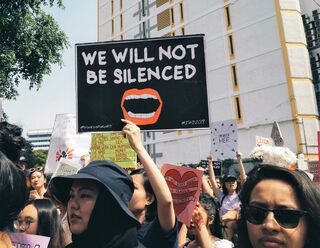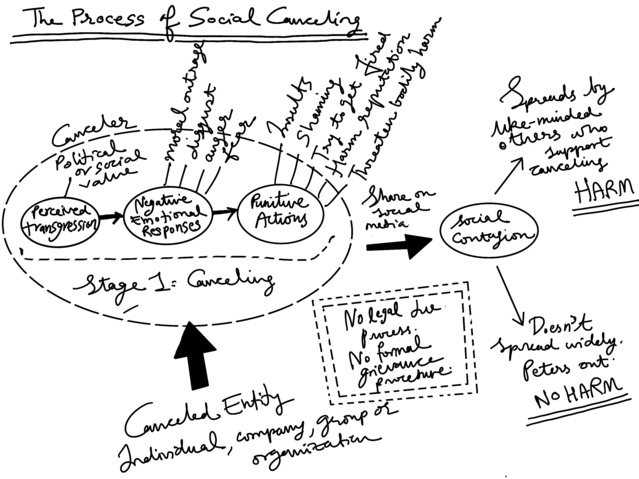Media
What Is Cancel Culture?
Canceling is a complex individual act that spreads to groups and can cause harm.
Posted July 27, 2020 Reviewed by Ekua Hagan
"Just about every week we see the same story. Someone takes a jittery smartphone video of a white person caught in the act of doing something that's labeled racist. An army of online commentators mobilizes. The video goes viral. And the person in the video is publicly shamed, often losing a job or being ostracized by the community. His or her name becomes a hashtag for hate." —John Blake

During the COVID-19 pandemic, no other social phenomenon has been as widely written about, discussed, and argued over as cancel culture. Everyone uses their own definition, contradicting others, sowing confusion, arousing anger, scorn, and moral outrage, and stifling debate. Many psychology researchers view cancel culture as synonymous with social media activism, but this doesn't fully explain the psychology behind it.
For researchers, defining a concept carefully and delineating its domain and boundaries is an essential early step in its study. A good definition provides the foundation for a shared understanding and leads to clarity and insight. Given the ramifications of cancel culture on individuals and institutions today, I want to attempt to define it in this post.
What Is Canceling?
Canceling is an individual's volitional act of publicly rejecting and actively pursuing harm against a perceived transgressor. There are two parties in every canceling episode: the person who cancels (the canceler) and the entity — person, group, or organization that is canceled. Canceling requires the canceler to engage in three psychological processes:
- To identify or become aware of a transgression and judge it to be significant
- To experience strong negative emotions
- To act punitively and visibly to harm the transgressor
Canceling begins with a real or perceived transgression by the canceled entity that the canceler observes or is made aware of and deems to be serious. The transgression can be about anything such as the violation of a strongly-held political value (effusively praising a loathed politician) or a social justice value (tweeting in support of transphobia, saying something racist to a stranger, etc.) that the canceler deems to be significant. A strongly-held value in a different domain like animal welfare also qualifies as a transgression, like serving lion meat or swan meat in one's restaurant.
The canceler experiences strong negative emotions such as outrage, disgust, fear, and anger in response to the transgression. This results in an active and public rejection response (e.g., calling them out) along with other punitive, socially visible actions of varying degrees (getting them fired, shaming them, ruining their reputation, etc.) and private actions (threatening them through email).
Anyone can be canceled; celebrities like J. K, Rowling and Roseanne Barr, non-celebrities like the former Chipotle manager Dominique Moran, and companies like Goya Foods and Kindness Yoga have all been recent targets of canceling (see graphic below showing the canceling process).

Canceling is similar in some respects to ghosting and boycotting, two other types of rejections. Like ghosting, the canceler desires to break their ties with the canceled entity. But unlike ghosting, the canceler also actively seeks to punish and harm them. Ghosting is private, passive rejection, whereas canceling is vigorous, public, retaliatory rejection. Boycotting usually applies to businesses and is about the withdrawal of financial support, such as making purchases. Canceling is broader, often targets individuals, and uses a variety of punitive actions. Both boycotting and canceling are meant to punish the perceived transgressor. However, canceling goes much further, stemming from stronger emotional reactions (see figure).
A core characteristic of canceling (relative to other rejections) is that to many (but not all) observers, the canceler's punitive actions appear disproportionate to the magnitude of the transgression. Relatedly, when canceling someone, the canceler bypasses the legal due process. There is no complaint, no trial, no prosecution, no conviction, and no presumption of "innocent until proven guilty." The canceler's judgment that the transgressor is at fault is sufficient to trigger punitive action.
Canceling as Social Contagion
An individual act of canceling is psychological rejection. When it is communicated through social media and joined in by other individuals who feel the same way or are looking for an "outrage fix," canceling spreads like a contagion, amplifying the harm to the canceled entity. It becomes social canceling. Instead of one person, a group now seeks punitive action against the canceled entity. The reach and speed afforded by "the hydra of social media" provide the fuel for its spread. Social contagion is the second essential step, the "culture" aspect of canceling. Psychologically speaking, cancel culture should really be called "social canceling" because that is what it is. With this background, we can define social canceling this way:
Social canceling is the collective public rejection of a person, group, or organization for a perceived transgression that spreads through social media and is marked by strong negative emotional reactions and the pursuit of visible punitive actions.
What Social Canceling Is Not
This definition explains the limits of social canceling. Despite its association with social justice movements by many writers, as a two-step psychological process, social canceling is agnostic to political affiliation, ideology, or another property. Nor is it limited to celebrities or well-known companies, or to certain forms of perceived transgressions. Anyone can cancel, and anyone can be canceled for any reason as long as enough people think that the target has transgressed and they are willing to act punitively on their beliefs.

Social canceling is not based on a balanced assessment of the transgression or any absolute criterion of wrongdoing. Because it's a visceral response and relies on one particular shared understanding of the transgression (through the lens of a political or a social ideology), one side of the story so to speak, every canceling campaign is necessarily grounded in bias. However, the lack of tolerance for opposing views, the restriction of free speech by coercion or censorship, and the disproportionate punishment given to the canceled entity are separate processes, marshaled in support of punitive action. They may influence how the social canceling process unfolds and its outcomes, but more often than not, they are environmental factors that vary from one instance to the next.
Not every attempt to socially cancel someone is successful. We become aware of attempts to cancel that go viral and are noticed and reported by the mainstream media. These are the ones most likely to cause reputational and tangible harm to the target. There may be far more episodes of canceling that never spread beyond one or a few cancelers and which eventually peter out without having much effect on the canceled entity.




